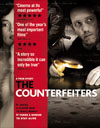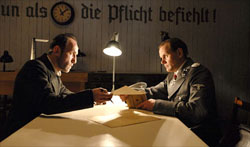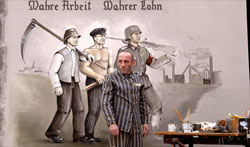2008
Main Movie
Page
Atonement
Boy in the Striped Pajamas
Brideshead Revisited
Counterfeiters
The Dark Knight
Enchanted
Frozen River
Indiana Jones and the Kingdom of the Crystal Skull
Iron Man
Juno
Man on Wire
Michael Clayton
No Country
for Old Men
Rachel Getting Married
the Savages
The Secret Life of Bees
Sweeney Todd
There Will Be Blood
The Visitor
WALL-E
Film
Reviews from 2007
Film Reviews
from 2006
Despite excellent reviews and an Oscar as Best Foreign Language Picture (the first ever for the country of Austria), I was hesitant about seeing The Counterfeiters. When I heard that much of it took place in a Nazi concentration camp, I wondered what the movie could offer that others, like Schindler’s List, had already shown. I didn’t think I wanted to stomach the horrors of the Holocaust again. I’m glad I overcame my hesitation because I found The Counterfeiters to be a remarkable film, perhaps even a great film. Even though most of it does take place in a Nazi concentration camp, the film tells a unique, fascinating story I had not known, with many moral implications. The Counterfeiters tells the true story of Salomon Sorowitsch (excellently played by Austrian actor Karl Markovics), a Russian born Jew living in Berlin in 1936. Sorowitsch is a master forger, who will forge any document for a price. He is arrested by an officer named Herzog, and sent to prison. In 1939, when the war begins, Sorowitsch is transferred to a brutal concentration camp, in which killings occur daily. In order to survive, Sorowitsch wins favor by using his artistic talent to paint portraits of the Nazis and their families.
Sorowitsch and his colleagues soon discover the scheme, which is dependent upon their talents. Herzog sees to it that the team is very well treated: with clean, comfortable barracks, good food, and good working conditions. Yet the counterfeiters know that millions of others are being starved tortured and killed, even in their own camp. Do they cooperate with the enemy to save their own lives, or risk sabotage or refusal to cooperate, and be killed? The counterfeiters themselves are divided on this question. Sorowitsch, the crafty survivor, who prides himself on his ability to adapt to any situation for his survival, wrestles with the moral dilemma himself, and on behalf of the counterfeiting team. Despite their internal differences, they will not betray one another.
Austrian director Stefan Ruzowitzky has created a profoundly moving, fascinating, and disturbing film. There’s a strange, haunting beauty to the photography and settings. In a beautifully shot and staged scene, Horowitz rewards the team for good work with a ping pong table. In another, the team listens in horror as a man is shot right outside their fenced-in yard, with his blood trickling into their safe environment. Even though I’d never heard of Ruzowitzky, it’s clear that he’s a great filmmaker in his own right. The cast of German and Austrian actors works very well with a fine screenplay to flesh out each character, giving him a distinct personality: the fiery idealist, bent on sabotage, the doctor who wants to care for the others, the one only interested in his own survival, the vulnerable young man growing progressively more ill with tuberculosis. Markovics, as Sorowitsch, becomes the eyes of the audience, watching over it all, wavering in allegiance, trying to get his team to live and work together, and caring for his sick young friend. As I watched, and drove home from the theater, I wondered what I would do in such a terrible situation, and face choices no one should have to face: Would I be brave and resist? Or see my own survival as the ultimate goal? I also wondered how often I cooperate with evil in ways large and small in my daily life and ministry. How do I rationalize my behavior then? This would be a good film for a group discussion on moral choices we make under difficult situations. While I don’t always agree with the Academy’s decisions, I’m very glad they gave the Oscar to The Counterfeiters, bringing this excellent film to the attention of a wider audience. My guess is that The Counterfeiters will disappear from theaters soon. I hope it will be available on DVD in a couple of months. It’s definitely worth searching out and seeing. You won’t soon forget it. Tom Condon, OP
|
WINNER Academy Award: best foreign language film (2007) |
subscribe to
DomLife.org and receive a free email update every two weeks. unsubscribe |



 The Counterfeiters
The Counterfeiters In 1944, Sorowitsch is transferred to another camp where he once again
meets Herzog, who is the commandant. In this camp, a team of prisoners
is assembled to make counterfeit British and American currency. The
plan of the nearly bankrupt Nazi regime is to distribute massive amounts
of the fake currency, thus ruining the British and American economies.
In 1944, Sorowitsch is transferred to another camp where he once again
meets Herzog, who is the commandant. In this camp, a team of prisoners
is assembled to make counterfeit British and American currency. The
plan of the nearly bankrupt Nazi regime is to distribute massive amounts
of the fake currency, thus ruining the British and American economies. Despite the fact that the counterfeiters are treated so well, their
captors never let them forget that they belong to a despised race, and
are targets of racial slurs, humiliation, and threats. They even
work under the words painted on the wall of their workspace, “Jews
are swine.” It’s obvious that, even though the Nazis
are dependent upon the counterfeiters success, they would never consider
them equals.
Despite the fact that the counterfeiters are treated so well, their
captors never let them forget that they belong to a despised race, and
are targets of racial slurs, humiliation, and threats. They even
work under the words painted on the wall of their workspace, “Jews
are swine.” It’s obvious that, even though the Nazis
are dependent upon the counterfeiters success, they would never consider
them equals.